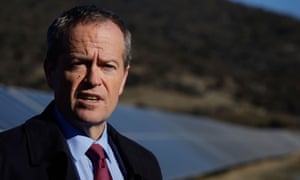Bill Shorten
says Labor is prepared to pass legislation giving effect to the Finkel
review this year, and has called for the Turnbull government to sit down
with the opposition to craft a bipartisan solution.
The Labor leader will use a speech to a clean energy summit in Sydney to make a pitch for a “sensible centre” in climate policy, arguing that Australia cannot afford to lose another decade “to brawling and name-calling”.
“I think there have been enough battles, more than enough,” Shorten will say on Tuesday. “I say instead of choosing a new battlefield, or revisiting an old one, let’s find common ground, the sensible centre.”
Shorten will tell the summit that, if legislation can be produced and passed this year, sensible action won’t be “buried or derailed by an election campaign”.
Energy ministers last Friday signed off on 49 of the 50 recommendations put forward by the chief scientist, Alan Finkel, in his review of the national electricity market.
But the Turnbull government remains divided over Finkel’s central
recommendation – a new clean energy target to replace the federal
renewable energy target once it ends in 2020 – and has deferred
discussion through the Council of Australian Governments energy council
on that measure.
To maintain pressure on Canberra, and push through the current deadlock, the Labor states are moving ahead of the Turnbull government with preparatory steps on the clean energy target.
Queensland, Victoria, South Australia and the Australian Capital Territory have asked the Australian Energy Markets Commission to do further work on how the central recommendation of Finkel could be implemented by a group of like-minded states if the Turnbull government ultimately drops the proposal.
Some Liberals remain opposed to the target but the Nationals leader, Barnaby Joyce, signalled last week he would take a positive recommendation to his party room if the Liberals proposed a clean energy target with a high enough threshold to allow coal-fired generators to receive certificates.
Labor, thus far, has signalled on many occasions it is not prepared to accept a clean energy target with a threshold set high enough to include “clean” coal.
But Shorten’s speech on Tuesday attempts to strike a conciliatory tone. He says the opposition will back a clean energy target “if the economic and environmental case stacks up”.
The Labor leader says he doesn’t intend to write the government “a blank cheque” in the response to the Finkel review but the opposition is prepared to be constructive.
He says if the government genuinely wants a solution to the impasse of the past decade, it needs to work more closely with Labor.
“I want Labor involved in the policy design and the drafting process, because I believe that’s how we can guarantee the best possible outcome – for jobs and investment and for Australian families and businesses,” Shorten will say.
“[Energy minister] Josh Frydenberg should sit down with [the shadow climate change minister] Mark Butler as a starting point.”
The Labor leader will use a speech to a clean energy summit in Sydney to make a pitch for a “sensible centre” in climate policy, arguing that Australia cannot afford to lose another decade “to brawling and name-calling”.
“I think there have been enough battles, more than enough,” Shorten will say on Tuesday. “I say instead of choosing a new battlefield, or revisiting an old one, let’s find common ground, the sensible centre.”
Shorten will tell the summit that, if legislation can be produced and passed this year, sensible action won’t be “buried or derailed by an election campaign”.
Energy ministers last Friday signed off on 49 of the 50 recommendations put forward by the chief scientist, Alan Finkel, in his review of the national electricity market.
To maintain pressure on Canberra, and push through the current deadlock, the Labor states are moving ahead of the Turnbull government with preparatory steps on the clean energy target.
Queensland, Victoria, South Australia and the Australian Capital Territory have asked the Australian Energy Markets Commission to do further work on how the central recommendation of Finkel could be implemented by a group of like-minded states if the Turnbull government ultimately drops the proposal.
Some Liberals remain opposed to the target but the Nationals leader, Barnaby Joyce, signalled last week he would take a positive recommendation to his party room if the Liberals proposed a clean energy target with a high enough threshold to allow coal-fired generators to receive certificates.
Labor, thus far, has signalled on many occasions it is not prepared to accept a clean energy target with a threshold set high enough to include “clean” coal.
But Shorten’s speech on Tuesday attempts to strike a conciliatory tone. He says the opposition will back a clean energy target “if the economic and environmental case stacks up”.
The Labor leader says he doesn’t intend to write the government “a blank cheque” in the response to the Finkel review but the opposition is prepared to be constructive.
He says if the government genuinely wants a solution to the impasse of the past decade, it needs to work more closely with Labor.
“I want Labor involved in the policy design and the drafting process, because I believe that’s how we can guarantee the best possible outcome – for jobs and investment and for Australian families and businesses,” Shorten will say.
“[Energy minister] Josh Frydenberg should sit down with [the shadow climate change minister] Mark Butler as a starting point.”

No comments:
Post a Comment